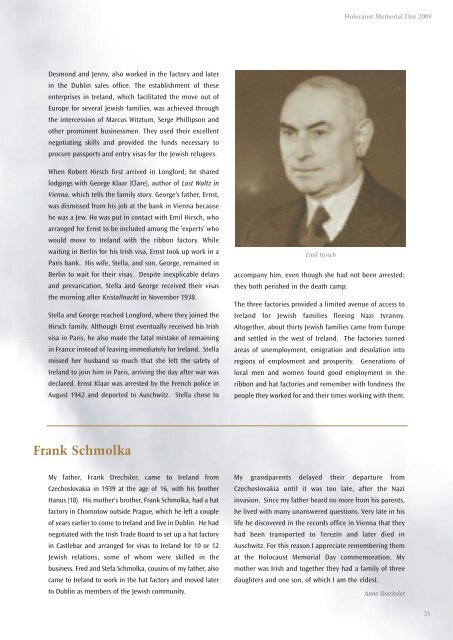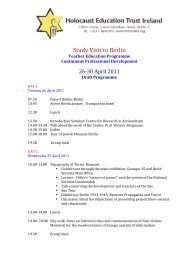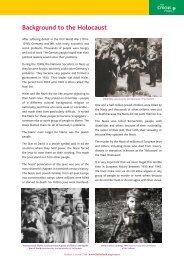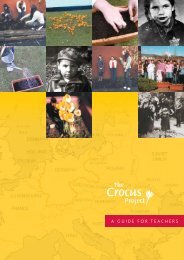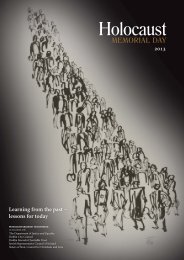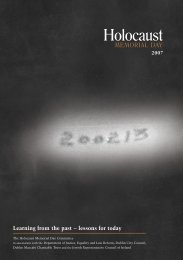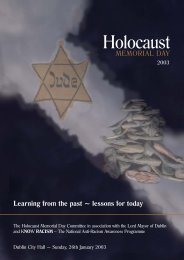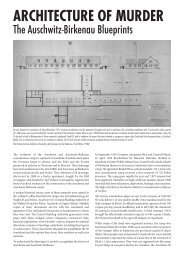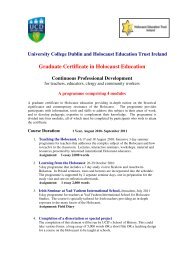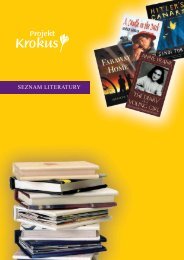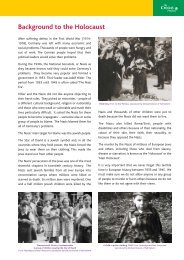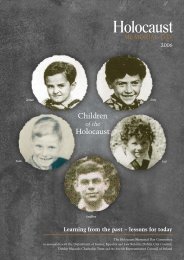Learning from the past ~ lessons for today - Holocaust Education ...
Learning from the past ~ lessons for today - Holocaust Education ...
Learning from the past ~ lessons for today - Holocaust Education ...
You also want an ePaper? Increase the reach of your titles
YUMPU automatically turns print PDFs into web optimized ePapers that Google loves.
<strong>Holocaust</strong> Memorial Day 2009<br />
Desmond and Jenny, also worked in <strong>the</strong> factory and later<br />
in <strong>the</strong> Dublin sales office. The establishment of <strong>the</strong>se<br />
enterprises in Ireland, which facilitated <strong>the</strong> move out of<br />
Europe <strong>for</strong> several Jewish families, was achieved through<br />
<strong>the</strong> intercession of Marcus Witztum, Serge Phillipson and<br />
o<strong>the</strong>r prominent businessmen. They used <strong>the</strong>ir excellent<br />
negotiating skills and provided <strong>the</strong> funds necessary to<br />
procure passports and entry visas <strong>for</strong> <strong>the</strong> Jewish refugees.<br />
When Robert Hirsch first arrived in Long<strong>for</strong>d, he shared<br />
lodgings with George Klaar (Clare), author of Last Waltz in<br />
Vienna, which tells <strong>the</strong> family story. George’s fa<strong>the</strong>r, Ernst,<br />
was dismissed <strong>from</strong> his job at <strong>the</strong> bank in Vienna because<br />
he was a Jew. He was put in contact with Emil Hirsch, who<br />
arranged <strong>for</strong> Ernst to be included among <strong>the</strong> ‘experts’ who<br />
would move to Ireland with <strong>the</strong> ribbon factory. While<br />
waiting in Berlin <strong>for</strong> his Irish visa, Ernst took up work in a<br />
Paris bank. His wife, Stella, and son, George, remained in<br />
Berlin to wait <strong>for</strong> <strong>the</strong>ir visas. Despite inexplicable delays<br />
and prevarication, Stella and George received <strong>the</strong>ir visas<br />
<strong>the</strong> morning after Kristallnacht in November 1938.<br />
Stella and George reached Long<strong>for</strong>d, where <strong>the</strong>y joined <strong>the</strong><br />
Hirsch family. Although Ernst eventually received his Irish<br />
visa in Paris, he also made <strong>the</strong> fatal mistake of remaining<br />
in France instead of leaving immediately <strong>for</strong> Ireland. Stella<br />
missed her husband so much that she left <strong>the</strong> safety of<br />
Ireland to join him in Paris, arriving <strong>the</strong> day after war was<br />
declared. Ernst Klaar was arrested by <strong>the</strong> French police in<br />
August 1942 and deported to Auschwitz. Stella chose to<br />
Emil Hirsch<br />
accompany him, even though she had not been arrested;<br />
<strong>the</strong>y both perished in <strong>the</strong> death camp.<br />
The three factories provided a limited avenue of access to<br />
Ireland <strong>for</strong> Jewish families fleeing Nazi tyranny.<br />
Altoge<strong>the</strong>r, about thirty Jewish families came <strong>from</strong> Europe<br />
and settled in <strong>the</strong> west of Ireland. The factories turned<br />
areas of unemployment, emigration and desolation into<br />
regions of employment and prosperity. Generations of<br />
local men and women found good employment in <strong>the</strong><br />
ribbon and hat factories and remember with fondness <strong>the</strong><br />
people <strong>the</strong>y worked <strong>for</strong> and <strong>the</strong>ir times working with <strong>the</strong>m.<br />
Frank Schmolka<br />
My fa<strong>the</strong>r, Frank Drechsler, came to Ireland <strong>from</strong><br />
Czechoslovakia in 1939 at <strong>the</strong> age of 16, with his bro<strong>the</strong>r<br />
Hanus (18). His mo<strong>the</strong>r's bro<strong>the</strong>r, Frank Schmolka, had a hat<br />
factory in Chomotow outside Prague, which he left a couple<br />
of years earlier to come to Ireland and live in Dublin. He had<br />
negotiated with <strong>the</strong> Irish Trade Board to set up a hat factory<br />
in Castlebar and arranged <strong>for</strong> visas to Ireland <strong>for</strong> 10 or 12<br />
Jewish relations, some of whom were skilled in <strong>the</strong><br />
business. Fred and Stefa Schmolka, cousins of my fa<strong>the</strong>r, also<br />
came to Ireland to work in <strong>the</strong> hat factory and moved later<br />
to Dublin as members of <strong>the</strong> Jewish community.<br />
My grandparents delayed <strong>the</strong>ir departure <strong>from</strong><br />
Czechoslovakia until it was too late, after <strong>the</strong> Nazi<br />
invasion. Since my fa<strong>the</strong>r heard no more <strong>from</strong> his parents,<br />
he lived with many unanswered questions. Very late in his<br />
life he discovered in <strong>the</strong> records office in Vienna that <strong>the</strong>y<br />
had been transported to Terezín and later died in<br />
Auschwitz. For this reason I appreciate remembering <strong>the</strong>m<br />
at <strong>the</strong> <strong>Holocaust</strong> Memorial Day commemoration. My<br />
mo<strong>the</strong>r was Irish and toge<strong>the</strong>r <strong>the</strong>y had a family of three<br />
daughters and one son, of which I am <strong>the</strong> eldest.<br />
Anne Drechsler<br />
21


